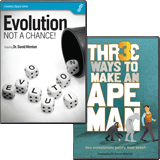News to Note, April 18, 2009
A weekly feature examining news from the biblical viewpoint
Noah’s Ark, Hong Kong style; instantaneous evolution; the sophisticated lives of sea scorpions; and more!
1. Noah's Ark, Hong Kong Style
We were deluged with media tips this week about the Wall Street Journal’s front-page coverage of a Noah’s Ark replica.
2. Instantaneous Evolution
Early humans weren’t very good at swinging from trees. But if you think that has evolutionists doubting human evolution, think again.
3. Sophisticated Sea Scorpions
Who were the first tool users: Humans? Apes? Crows? No, say evolutionists; it may have been “scorpion-like sea beasts” (and no, they’re not kidding)!
4. LiveScience: “Three Subgroups of Neanderthals Identified”
“Neanderthal” may actually be an umbrella term referring to three different subgroups, according to a new DNA study.
Using computer simulations, researchers at the University of the Mediterranean analyzed DNA sequence fragments from 12 Neanderthal fossils. The results indicate that “Neanderthals” may have been three or four distinct genetic groups. Of the subgroups, one appears to have lived in Western Europe, a second in Southern Europe around the Mediterranean, a third in Eastern Europe (extending into the Middle East), and a possible fourth subgroup in Western Asia.
Although the LiveScience article calls Neanderthals “cavemen-like creatures,” the archaeological facts confirm Neanderthals as intelligent, civilized humans, who—as the article does mention—may have interbred with (other) modern humans. The creation model understands Neanderthals as, essentially, modern humans with a few peculiar skeletal differences (possibly made more peculiar by rickets). Some of these features even exist, to a lesser degree, in modern humans. If Neanderthals were around today, the differences would probably be considered comparable to the superficial differences that separate humans now. Additionally, discovering that there was likely a range of Neanderthal types (rather than one monolithic group) supports the idea that the descendants of Noah included a range of variation within the human kind, only some of which survives today.
That said, we echo the caution given by the study’s authors, who note that the results were based on a limited sample of mitochondrial DNA fragments. Princeton University anthropologist Alan Mann explained, “This is very interesting research but it’s very premature in our study to be able to draw any but the most generalized and preliminary conclusions.”
For more information:
5. BBC News: “Stem Cells ‘Can Treat Diabetes’”
Scientists have made yet another stem cell breakthrough—once again, with adult stem cells.
In the joint U.S.–Brazilian project, 20 of 23 patients with type 1 diabetes were able to go for up to four years without insulin injections. Instead, those patients produced their own insulin after receiving a transplant of stem cells taken from their own bone marrow. Even the three who could not produce enough of their own insulin needed less injected insulin than before.
The researchers concluded that success is based on how soon the transplant occurs after the diagnosis of diabetes. For those who had been diagnosed with diabetes more than three months prior, their immune systems had already destroyed the body’s islet cells. The team also clarified that this was not a complete cure for type 1 diabetes, nor would it be of benefit to those with type 2 diabetes (whose bodies still produce insulin).
Diabetes U.K. research director Iain Frame cautioned, “We would like to see this experiment carried out with a control group for comparison of results and a longer-term follow up in a greater number of people. . . . It would be wrong to unnecessarily raise the hopes of people living with diabetes about a new treatment for the condition on the back of the evidence provided in this study.” But while exuberance is unwarranted, it is nonetheless encouraging to learn of another potential medical treatment based on life-honoring adult stem cells (i.e., those that don’t require destruction of an embryo—a tiny, developing human life).
For more information:
- The Debate over Stem Cells
- Stem Cells
- Get Answers: Cloning
6. MRI Prayer
Praying is just like ordinary conversation—but is that really evidence against Christianity?
In what seems to be a common experiment, a team led by University of Aarhus researcher Uffe Schjødt used an MRI machine (technology developed by a creationist, by the way) to scan the brains of 20 “devout Christians” while they prayed.
And Don’t Miss . . .
- A study of bear fossils confirms that multiple bear types were at least partially herbivorous—showing that they could have lived on plant-only diets before the Fall. Also on the topic of post-Fall animal violence, a new study of octopi shows that all species are venomous. The study also suggests a single common ancestor for octopi, cuttlefish, and squid (possibly belonging to one original created kind). For more on this topic, see
- Scientists in Dubai have cloned a camel. Why? Cloning is “a means of preserving the valuable genetics of our elite racing and milk producing camels in the future,” one of the involved scientists said.
- A South American species of ant is male free, apparently. While asexual reproduction is common among ants, this is the first known female-only species. And of course, it means this species has less genetic information.
- An egg gathered by Charles Darwin on his Beagle voyage has been found—albeit still in its cracked state, as Darwin had placed it in a box too small for it.
- A new method may help astronomers find exoplanets with liquid oceans. Now it’s time to wait for any actual discoveries.
- Dinesh D’Souza offers a look at the frightening consistency of Peter Singer, an “intellectually honest” atheist. (Ken Ham covered this news in his blog; see Extreme or Consistent?)
- ScienceNOW reports on drug-resistant parasites and a new line of medicine designed to combat that resistance. That’s great news, but we want to remind readers that drug resistance isn’t evidence of evolution; see Antibiotic Resistance of Bacteria: An Example of Evolution in Action?
- Self-control isn’t a part of our fallen human nature: it’s what the Bible makes clear, and what scientists confirm.
- Is it the impact of evolution on ecosystems—or is it natural selection?
- Astronomers are searching for remains of the hypothetical planet thought to have collided with the earth and formed the moon. So if they don’t find any evidence of it, does that mean their moon-origin hypothesis has been falsified?
- The results of a Theos survey show that the erosion of the Christian worldview hasn’t led to a new scientific age; rather, it has eroded scientific thinking and left Christianity increasingly replaced by occultic beliefs (often billed as “New Age”).
- Penn State Live released news of a study that pushes back evolutionary estimates for an oxygenated atmosphere to 3.46 billion years ago.
- Bus campaigns are all the rage now for atheists, and the Indiana Atheist Bus Campaign—in a state just a few miles from the Creation Museum—is one of the latest efforts. Not that the possibility scares us; from the photographs, the banner, which reads “You can be good without God,” appears to be hardly readable.
- Some readers asked if we thought there was any significance to the “hand in space.” We don’t think so. First, the image is not real—the blue is false coloring given to X-rays, which are invisible to human eyes. Second, the image is only vaguely (not specifically) like a hand; seeing a hand is an example of pareidolia, like seeing a supposed image of Jesus in a piece of toast.
For More Information: Get Answers
Remember, if you see a news story that might merit some attention, let us know about it! (Note: if the story originates from the Associated Press, FOX News, MSNBC, the New York Times, or another major national media outlet, we will most likely have already heard about it.) And thanks to all of our readers who have submitted great news tips to us. If you didn’t catch all the latest News to Know, why not take a look to see what you’ve missed?
(Please note that links will take you directly to the source. Answers in Genesis is not responsible for content on the websites to which we refer. For more information, please see our Privacy Policy.)
Recommended Resources

Answers in Genesis is an apologetics ministry, dedicated to helping Christians defend their faith and proclaim the good news of Jesus Christ.
- Customer Service 800.778.3390
- © 2025 Answers in Genesis



